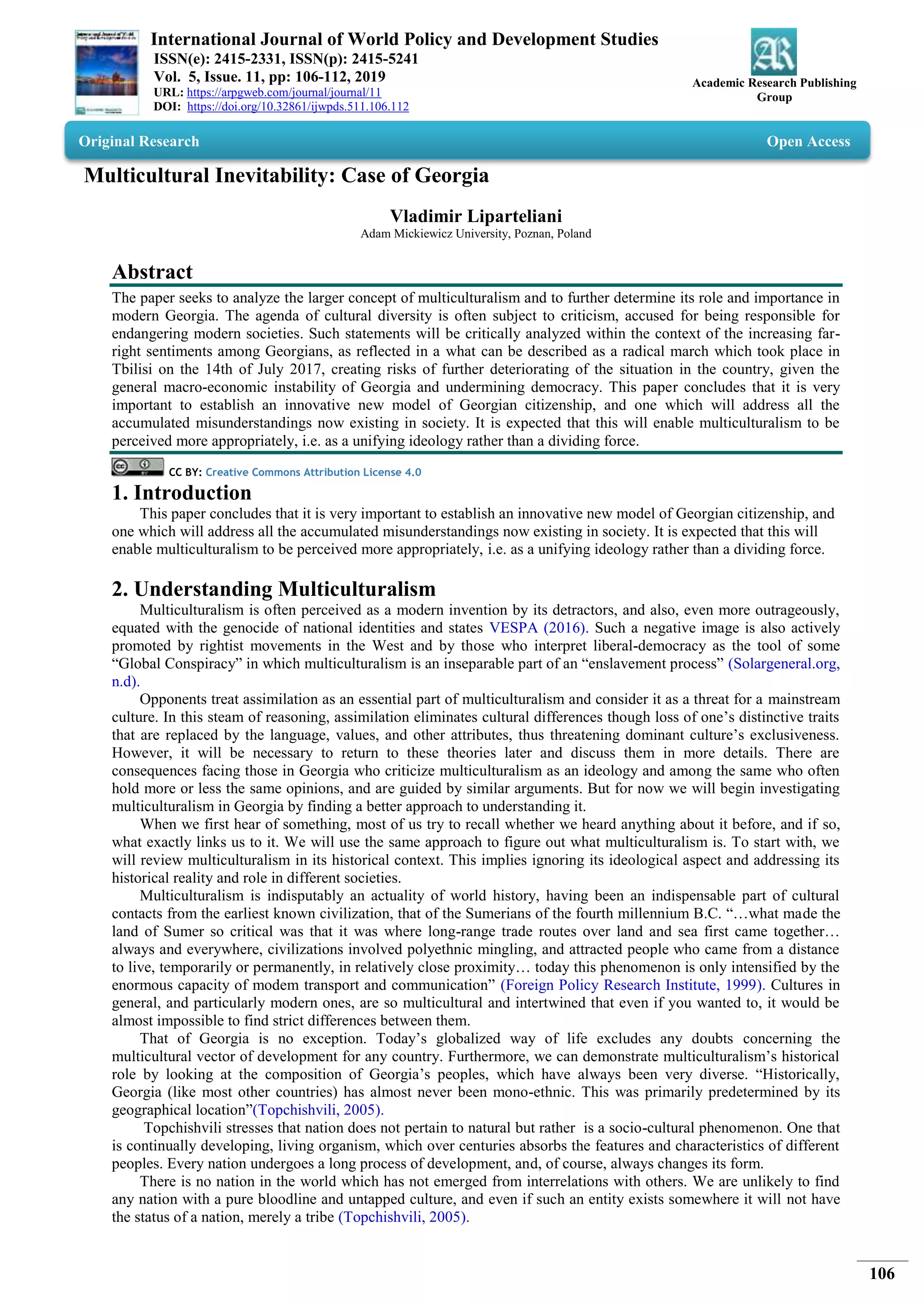The paper analyzes the significance and challenges of multiculturalism in modern Georgia, particularly in light of rising far-right sentiments. It posits that a new model of Georgian citizenship is essential to foster multiculturalism as a unifying ideology rather than a divisive one, emphasizing the historical diversity of Georgian society. Additionally, the document critiques the criticisms of multiculturalism, arguing for its necessity in a globalized world and acknowledging the ongoing tensions and misunderstandings surrounding cultural identities.






![International Journal of World Policy and Development Studies
112
References
Barbashin, M. (2012). Soviet identity in ethno-social space: institutional features. [online] cyberleninka.ru.:
Available: https://cyberleninka.ru/article/n/sovetskaya-identichnost-v-etnosotsialnom-prostranstve-
institutsionalnye-osobennosti
Census, G. (2016). Mosakhleobis 2014 tslis sakoveltao aghceris dziritadi shedegebi. Available:
http://census.ge/files/results/Census%20Release_GEO.pdf
Census, G. (2019). Census - demographiuli da sotsialuri makhasiateblebi. Available:
http://census.ge/ge/results/census1/demo
Chardin, J. (1815). Travels of sir john chardin through mingrelia and georgia into persia. Dublin: J. Christie. 375.
Chkhartishvili, M. (2013). Georgian nationalism and the idea of georgian nation. Available:
https://www.researchgate.net/publication/291882979_Georgian_Nationalism_and_the_Idea_of_Georgian_
Nation
Crrc-caucasus.blogspot.com. (2019). Georgia’s far-right are anti-Russian but share Russian narratives. Available:
http://crrc-caucasus.blogspot.com/2019/04/georgias-far-right-are-anti-russian-but.html
Expressnews, G. (2019). Chveni quchebi ucxo qveknebis kriminalebisgan gaitsmindeba“ - 14 ivlis «qartvelta
marshi» - EPN.: Available: https://expressnews.com.ge/?id=48272
Foreign, A. (2019). The financial crisis is still empowering far-right populists. Available:
https://www.foreignaffairs.com/articles/2018-09-13/financial-crisis-still-empowering-far-right-populists
Foreign Policy Research Institute (1999). Multiculturalism in world history - foreign policy research institute.
Available: https://www.fpri.org/article/1999/09/multiculturalism-in-world-history/
Gdi, G. (2019). Available: https://www.gdi.ge/uploads/other/0/708.pdf
Georgian Kingdom of Kartli 302 BC–580 AD:
Geostat, G. (2019). Dasaqmeba da umushevroba - saqartvelos statistikis erovnuli samsakhuri. Available:
https://www.geostat.ge/ka/modules/categories/38/dasakmeba-da-umushevroba
Groong.usc.edu. (2019). ANN/Groong -- Treaty of Berlin - 07/13/1878. [online] Available at: . Available:
http://groong.usc.edu/treaties/kars.html
JAM News (2019). Saqartveloshi somkhuri skolebis 5 dziritadi problema. Available: https://jam-
news.net/%E1%83%A1%E1%83%90%E1%83%A5%E1%83%90%E1%83%A0%E1%83%97%E1%83%9
5%E1%83%94%E1%83%9A%E1%83%9D%E1%83%A8%E1%83%98-
%E1%83%A1%E1%83%9D%E1%83%9B%E1%83%AE%E1%83%A3%E1%83%A0%E1%83%98-
%E1%83%A1%E1%83%99%E1%83%9D/?lang=ka
Japaridze, A., Saqartvelos, T. M. and Kivchagta, C. (2012). Available: http://www.nplg.gov.ge/gsdl//cgi-
bin/library.exe?e=d-01000-00---off-0patriarc--00-1----0-10-0---0---0prompt-10---4-------0-1l--11-ka-50---
20-about---00-3-1-00-0-0-11-1-0utfZz-8-
00&a=d&c=patriarc&cl=CL3&d=HASH0521810ff9a47db51542d8.13
Kymlicka, W. (2012). Multiculturalism: success, failure and the future.
Mythdetector, G. (2019 ). Claims about Iranians allegedly buying 70% of apartments in tbilisi are groundless | myth
detector. Available: https://www.mythdetector.ge/en/myth/claims-about-iranians-allegedly-buying-70-
apartments-tbilisi-are-groundless
Nikoladze, T. (2019). The Georgian March against migrants and NATO. [online] JAMnews. Available: https://jam-
news.net/the-georgian-march-against-migrants-and-nato/
RadioFreeEurope/RadioLiberty. (2019). Russia-georgia flight ban comes into force. Available:
https://www.rferl.org/a/putin-ban-on-direct-russia-georgia-flights-comes-into-force/30042902.html
Solargeneral.org (n.d). The collection of the works of David Lane. Available: http://www.solargeneral.org/wp-
content/uploads/library/collection-of-works-of-david-lane.pdf
The Irish Times (2015). Ireland becomes first country to approve same-sex marriage by popular vote. [online].
Available: https://www.irishtimes.com/news/politics/ireland-becomes-first-country-to-approve-same-sex-
marriage-by-popular-vote-1.2223646
Topchishvili, R. (2005). Ethnohistorical etudes. Tbilisi.
Topchishvili, R. (2019a). European values' relations with Georgian ones. [online] Georgie-europe2014.tsu.ge.
Available: http://georgie-europe2014.tsu.ge/french_geo/EVROPULI-GIREBULEBEBI-DA-IDENTOBA-
geo.pdf
Topchishvili, R. (2019b). European values' relations with Georgian ones. Available: http://georgie-
europe2014.tsu.ge/french_geo/EVROPULI-GIREBULEBEBI-DA-IDENTOBA-geo.pdf
TV (2019). Kvlevis tanakhmad politikur partiebs etnikuri umtsiresobebis mkholod 12.6% endoba, arasamtavrobo
organizaciebs ki 24.3% - 1TV. Available: https://1tv.ge/news/kvlevis-tanakhmad-politikur-partiebs-
etnikuri-umciresobebis-mkholod-12-6-endoba-arasamtavrobo-organizaciebs-24-3/
VESPA (2016). Ideologicheskoe oruzhie globalizma. Multiculturalizm. Available: https://vesparevenge.ru/?p=1188
Weigel, G. (2018). Europe’s two culture wars - commentary magazine. [online] commentary magazine. Available:
https://www.commentarymagazine.com/articles/europes-two-culture-wars/](https://image.slidesharecdn.com/ijwpds511106-200901081106/75/Multicultural-Inevitability-Case-of-Georgia-7-2048.jpg)